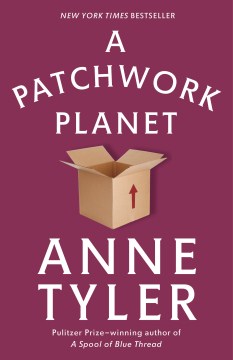by Andrew Hedglin
I know that Anne Tyler won the Pulitzer Prize (in 1989, for Breathing Lessons), but I still believe that she doesn’t really get her due in the modern literary cannon. Her audience is probably half as large as it should be, probably because many men (wrongfully) don’t see her novels about untranquil domesticity as relevant to them. I feel this worry is short-sighted, because when her novels have male protagonists, she does not ask them “what does it mean to be a man?”, but “what does it mean to be a person?”
 One such novel, A Patchwork Planet, (as well as Saint Maybe, one of my favorite novels ever and one I hope to write about on the blog some day soon) exhibits Tyler’s keen eye for characterization and humanity’s relentless search for a meaningful life.
One such novel, A Patchwork Planet, (as well as Saint Maybe, one of my favorite novels ever and one I hope to write about on the blog some day soon) exhibits Tyler’s keen eye for characterization and humanity’s relentless search for a meaningful life.
I picked up A Patchwork Planet (originally published in 1998), for the first time twelve years ago, during my first year of college, and recently again in anticipation of the release of Tyler’s new novel, Clock Dance (coming out in July). As you might imagine, it read very differently during very different points in my life.
A Patchwork Planet tells the story of Barnaby Gaitlin, an underachiever from a wealthy family, who progressed from a mild juvenile delinquency to a manual labor job helping elderly people accomplish their household tasks. He’s divorced with a daughter he sees once a month, and rents a room in somebody else’s house.
In addition to laboring under a set of generalized expectations, Barnaby is also yoked with a very specific and peculiar expectation: that every Gaitlin heir will meet his angel and be provided with guidance, wisdom, and purpose, just as the family’s paterfamilias had, long ago, when Grandfather Gaitlin invented his mannequin that made the family fortune.
Barnaby thinks he might have met his angel, a strait-laced blonde bank manager named Sophia, on a train to Philadelphia. As usual, Barnaby manages to complicate his quick, clean encounter by getting involved with her. But then again, maybe everything seems to progressing forward in Barnaby’s life: he’s picking up more work, makes headway on a decade-old debt he owes his parents, and starts seeing Opal, his daughter, more frequently.
Then, Sophia’s Aunt Grace accuses Barnaby of theft after learning of his troubled past. Sophia tries to intervene, thinking she can help, but she only confirms her own secret distrust of Barnaby while supposedly trying to help. Barnaby soon has to figure out whether he is capable of change, or if he is merely defined by his past actions, even to new friends and acquaintances.
One thing I did struggle with during this book, one that isn’t often much of a problem in Tyler’s writing, is that Tyler does struggle a little bit to manifest a believable blacksheep. Barnaby drinks in moderation, doesn’t do drugs, doesn’t curse, sleeps around a little bit but not a worrying amount; he is a genuinely good worker. He’s a disappointment relative to his opportunities, but he’s not quite the mess of a human being with a long list of bad habits he’d acquire in real life to merit such a soiled reputation.
Barnaby does have a yearning, however, to be a better person for the people around him, and it’s this quality that breathes life into his character. It’s also what makes him such a distinctly Tyler creation, another denizen of her Baltimore worlds that keeping bringing us back, making us look into ourselves and keep asking questions.


Comments are closed.